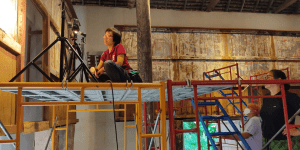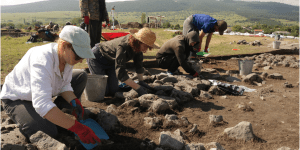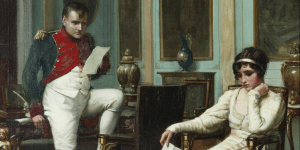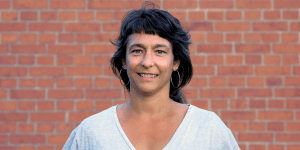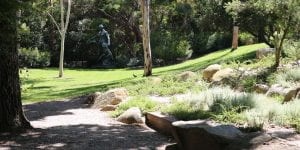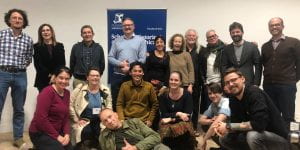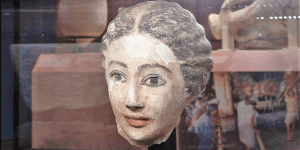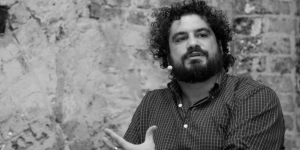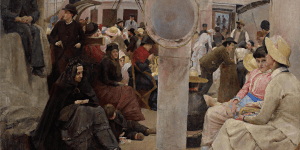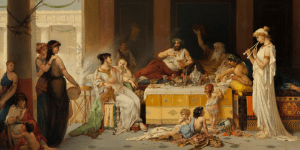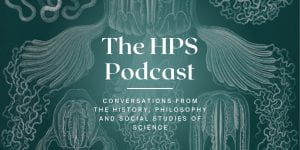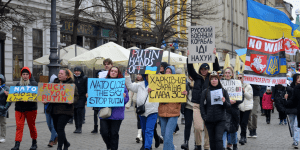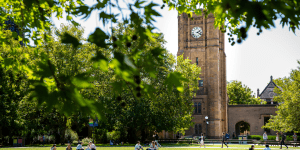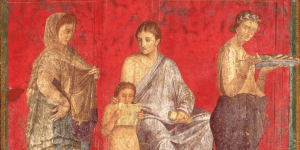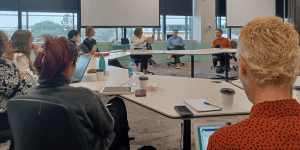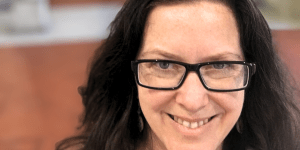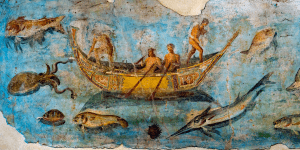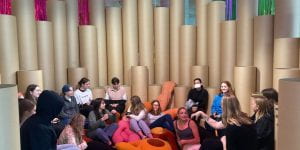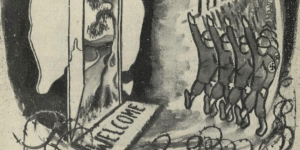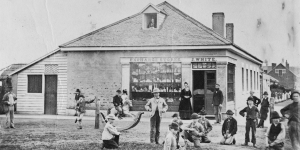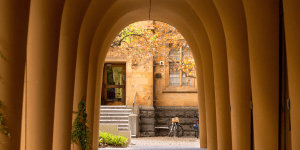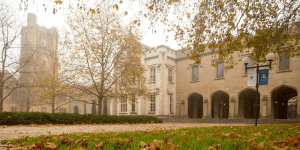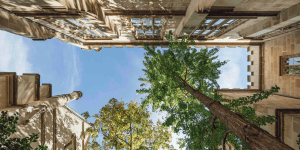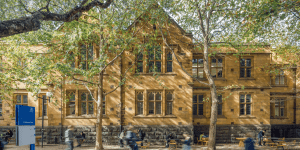dnicole
-
Ali Shammary
Ali Shammary (PhD in Philosophy, 2024), Absolute Poverty and Human Rights: An Examination of Factual and Normative Issues surrounding Absolute World Poverty -
‘The Man’: Taylor’s Feminism Could Go So Much Further
In another Swiftposium-related SHAPS post, republished from Pursuit, Gender Studies PhD Candidate Dana Fahadi examines Taylor Swift’s feminism, exploration of hegemonic masculinity, and how she can do more as a role model. I’m going to say at the outset, I am a Taylor Swift fan. She is my Goddess and I am one of the […]blogs.unimelb.edu.au/shaps-research/2024/02/08/the-man-taylors-feminism-could-go-so-much-further
-
‘The 1’: Something’s Been Forgotten in the Kanye-Taylor Feud
Ahead of Taylor Swift’s Australian tour, in this article republished from Pursuit, SHAPS History Lecturer Dr Sarah Walsh talks about the drama with another celebrity, Kanye West, that occurred almost 15 years ago, and some of the nuance that has been lost in the discussion over time. Before I weigh in on exactly what happened […] -
SHAPS Digest (January 2024)
A monthly roundup of media commentary, publications, projects and other news from across the School community.blogs.unimelb.edu.au/shaps-research/2024/02/06/shaps-digest-january-2024
-
Creative Solutions for Conservation Challenges in Thailand
The University of Melbourne has been collaborating with Silpakorn University, Thailand, since 1995. Most recently, a Memorandum of Understanding was signed between University of Melbourne’s Faculty of Arts and Silpakorn University’s Faculty of Science and Faculty of Painting, Sculpture and Graphic Arts. In March 2023 the University of Melbourne hosted an Incoming Research and Training Visit for residents of Silpakorn University’s Faculty of Science. During the visit, Assistant Professor Sutinee Girdthep and Dr Nattawan Worawannotai presented their work on the conservation of Thai heritage. Recent Master of Cultural Materials Conservation graduate Gen Schiesser reflects on the presentations below. -
Rabati 2023: Report on Georgian-Australian Investigations in Archaeology
The Georgian-Australian Investigations in Archaeology (GAIA) project is a research collaboration between the Georgian National Museum and the University of Melbourne. GAIA was established by the late Emeritus Professor Antonio Sagona and Dr Claudia Sagona. SHAPS’s Andrew Jamieson reports here on the 2023 season of the GAIA dig at Rabati, with contributions from Brian Armstrong, Giorgi Bedianashvili, Catherine Longford, Abby Robinson, Claudia Sagona and Martin Tomko. -
Ridley Scott: Historians Need to ‘Get a Life’
Napoleon director Ridley Scott is calling on us historians to “get a life” – and he has a point. Art is about more than historical facts. SHAPS Emeritus Professor Peter McPhee discusses the movie and the director’s stance in this article, republished from The Conversation. The release of Napoleon unleashed a torrent of objections to […]blogs.unimelb.edu.au/shaps-research/2023/12/06/ridley-scott-historians-need-to-get-a-life
-
Pascale Bastien
Pascale Bastien (PhD in Philosophy, 2023), Economic Growth, Liberalism, and the Good: A Contemporary Eudaimonistic Evaluation The majority of states worldwide pursue economic growth as a policy objective, and this tends to be justified in liberal and welfarist terms. However, the legitimacy of this pursuit is rarely debated and appears to be largely taken for […]blogs.unimelb.edu.au/shaps-research/2023/11/28/pascale-bastien
-
Annual Fellows’ Research Day
On 21 July 2023, the SHAPS Fellows & Friends of History held the annual Fellows’ Research Day. Fay Woodhouse wrote an overview of the day for Forum, discussing the speakers and their topics, as well as other enjoyable aspects of the day. The Annual SHAPS Fellows’ Research Day, held on a predictably cold Melbourne morning […]blogs.unimelb.edu.au/shaps-research/2023/11/13/annual-fellows-research-day
-
Melanie Brand
Melanie Brand [submitted as Melanie Davis] (PhD in History, 2023) ‘A Question of Trust: Secrecy and Intelligence Accountability in Cold War Australia’ Intelligence oversight and transparency have traditionally been conceptualised as a zero-sum equation in which decreases in secrecy were believed to come at the cost of intelligence agency efficacy. This thesis challenges that view. While […]blogs.unimelb.edu.au/shaps-research/2023/11/01/melanie-brand
-
Martin Carnovale
Martin Carnovale (PhD in Classics & Archaeology, 2023), The Language of Archaeological Investigations The thesis explores whether methods based upon analogical reasoning can be used to interpret culture if there are difficulties of translating other culture’s beliefs. The kind of cultural interpretation that I will discuss is that which pertains to social, artistic and religious […]blogs.unimelb.edu.au/shaps-research/2023/10/31/martin-carnovale
-
Remembering and Forgetting the Dead
Ancient Celtic Halloween – or All Hallow’s Eve – was a day to acknowledge the dead. Modern rituals of marking death continue this tradition, both remembering and letting go. In this article, republished from Pursuit, two of the DeathTech Research team –SHAPS’s Mike Arnold, together with Tamara Kohn (School of Social and Political Sciences) – discuss […]blogs.unimelb.edu.au/shaps-research/2023/10/30/remembering-and-forgetting-the-dead
-
Cancy Chu
Cancy Chu (PhD in Cultural Materials Conservation, 2023) ‘Preserving Plastics in Paper-Based Collections’ Plastics, referring to semi- or fully synthetic mouldable polymeric materials, are now found in a wide range of cultural heritage materials. Ongoing research focused on plastics in museum collections show that the chemical stability of certain plastics are short-lived. These unstable plastics […] -
SHAPS Digest (July 2023)
A monthly roundup of media commentary, publications, projects and other news from across the School community.blogs.unimelb.edu.au/shaps-research/2023/08/11/shaps-digest-july-2023
-
Robyn Cooper
Robyn Cooper, (MA in Classics & Archaeology, 2023) ‘Romans, Religion, and Residences: Investigating the Relationship of Domestic Spaces and Roman Homes throughout Pompeii, Herculaneum, and the Iberian Peninsula’ Using domestic cult spaces as a source material, this project explores how the nature of space within Roman residences interacted with and influenced on the expression of religious […] -
Beauty, Wine and Death in the Ancient World
Picture a woman gazing at her face in a small mirror of highly polished brass. She has never seen her whole body – no mirror is that large in the Greek and Roman worlds. She whitens her face with powdered chalk and reddens her cheeks with a dye made from the madder plant. Her fingers […]blogs.unimelb.edu.au/shaps-research/2023/08/03/beauty-wine-and-death-in-the-ancient-world
-
Has Russia Contained the Prigozhin Threat?
Its long history of managing violent mercenaries suggests so, as Professor Mark Edele explores in this article, republished from The Conversation. A month on since pundits declared the imminent start of a new Russian civil war, we’re still waiting. Moreover, we still know very little about what went on when Wagner leader Yevgeny Prigozhin launched […]blogs.unimelb.edu.au/shaps-research/2023/07/24/has-russia-contained-the-prigozhin-threat
-
We Need Good Policy to Back Working Dads
How do men feel when they become fathers? Associate Professor Daniel Halliday (Philosophy) and Professor Cordelia Fine (HPS), together with Dr Melissa Wheeler (Swinburne Business School) spoke to a handful of Australian dads who generously agreed to share their experiences on the new Working Fathers podcast – many spoke of deep emotional responses. “Probably the most […]blogs.unimelb.edu.au/shaps-research/2023/07/17/we-need-good-policy-to-back-working-dads
-
‘Wokeness’ and White Conservatives in America
Conservatives in the United States have launched an offensive against so-called wokeness as they head towards the 2024 Presidential Election. In this article, first published in the Conversation as, ‘Why ‘Wokeness’ has Become the Latest Battlefront for White Conservatives in America’, SHAPS Honorary Liam Byrne, together with Emma Shortis (SHAPS Graduate, RMIT) write about this […]blogs.unimelb.edu.au/shaps-research/2023/07/04/wokeness-and-white-conservatives-in-america
-
Guaraní Labour and British Capitalism
Dr Freg Stokes recently completed his PhD in History, focusing on the history of Indigenous resistance to colonisation in the Atlantic rainforest of South America from the early sixteenth century. In this video, originally produced for the Ka’a Body Exhibition at Paradise Row Gallery in London, he presents his findings on the role played by […]blogs.unimelb.edu.au/shaps-research/2023/06/26/guarani-labour-and-british-capitalism
-
Introducing Dr Andonis Piperoglou
In 2022 Dr Andonis Piperoglou was appointed the inaugural Hellenic Senior Lecturer in Global Diasporas. In this role Dr Piperoglou is teaching on topics related to migration, multiculturalism and cosmopolitanism, as well as the global dynamics of Hellenic culture and diaspora. Andonis frequently engages with the wider public on the relevance of Hellenism’s pasts and […] -
Reading the Nineteenth-Century Diaries of Girls Migrating to Australia
In the nineteenth century, a large number of girls and young women (aged from under 15 to their early 20s) made the long journey to Australia from various locations around the globe published. Hansen PhD Scholarship holder, Cat Gay (History), explored the emotional histories of some of these journeys in this recently published article from […] -
Tribute to Mark Raphael Baker
The School community was saddened by the death in early May of distinguished historian Mark Raphael Baker, inaugural Lecturer in Jewish Studies in 1988 and former Director of the Jewish Studies Program. We re-publish here a tribute by his father-in-law, Raimond Gaita (Honorary Professorial Fellow, Melbourne Law School and Arts), originally published in The Conversation. […]blogs.unimelb.edu.au/shaps-research/2023/06/11/raimond-gaita-farewells-mark-raphael-baker
-
Policing Women’s Drinking in Ancient Rome
SHAPS PhD Candidate Lily Moore (Classics & Archaeology), explores the consequences of imbibing alcohol for Roman women in this article, republished from The Conversation. The ancient Romans venerated wine. It was accessible to the masses, a fundamental staple of mainstream life, and an indispensable part of the Roman economy and trade. It was utilised in […] -
SHAPS Digest (May 2023)
A monthly roundup of media commentary, publications, projects and other news from across the School community.blogs.unimelb.edu.au/shaps-research/2023/06/08/shaps-digest-may-2023
-
The HPS Podcast is Here!
On May 31, a new SHAPS contribution to public outreach and engagement was released. The HPS Podcast shares fascinating contemporary research in History and Philosophy of Science with those outside the discipline. Each episode is designed to be short, engaging and entertaining. Covering a wide range of topics, this is a podcast for anyone with […]blogs.unimelb.edu.au/shaps-research/2023/06/02/the-hps-podcast-is-here
-
Is NATO to Blame for the Russo-Ukrainian War?
Mark Edele, SHAPS Hansen Professor in History and Deputy Dean, Faculty of Arts, explores this question in his review of Serhii Plokhy’s new book, The Russo-Ukrainian War (Allen Lane), republished here from The Conversation. A year after Russia’s all-out attack against its neighbour on 24 February 2022, volumes trying to explain the conflict to the […]blogs.unimelb.edu.au/shaps-research/2023/05/26/is-nato-to-blame-for-the-russo-ukrainian-war
-
“Habits of Civilised Life”
In this article, republished from The Conversation, Peter Prince (affiliate, Sydney Law School, University of Sydney), discusses Western Australia’s long history of discriminatory practices against Aboriginal people with regard to citizenship. The article’s reviewer, Julia Hurst, is Lecturer in Aboriginal & Torres Strait Islander History in SHAPS and Deputy Director of the Australian Centre in […]blogs.unimelb.edu.au/shaps-research/2023/05/23/habits-of-civilised-life
-
Gordon Dadswell
Gordon Dadswell (PhD in History & Philosophy of Science, 2023), ‘Working Wood: The State, Wood Science and Industry, Australia, 1918–1949′ This study identified the role of three national forest products laboratories and their relationship with other government agencies and specifically, to the Australian timber industry. The laboratories were established with several objectives, including to reduce […]blogs.unimelb.edu.au/shaps-research/2023/05/19/gordon-dadswell
-
Happy Ancient Roman Mother’s Day
SHAPS Honorary Tamara Lewit explores the celebration of Mother’s Day in ancient Rome, in this article, republished from Pursuit. Although the words ‘ancient Rome’ might evoke marching armies or gladiatorial combats, those armies and gladiators would never have existed without their mothers. Like us, the Romans celebrated a Mother’s Day. But never mind breakfast in […]blogs.unimelb.edu.au/shaps-research/2023/05/14/happy-ancient-roman-mothers-day
-
Conserving Performance: An Interview with Louise Lawson
The conservation of performance-based art is an intriguing and relatively new area of conservation. The presentation of live works has become more prominent in museums and galleries as these institutions strive to become more participatory and relational spaces. Works based on live performance are being increasingly acquired by major collecting institutions around the globe and […] -
Nicole Davis
Nicole Davis (PhD in History, 2023) ‘Nineteenth-century Arcades in Australia: History, Heritage & Representation’ This thesis explores the social and spatial histories of Australia’s nineteenth-century arcades from their beginning in Melbourne in 1853, with an emphasis on their first half century of development. It explores the retail, leisure and business activities they hosted and the lived experiences […]blogs.unimelb.edu.au/shaps-research/2023/04/19/nicole-davis-2
-
First Nations People Have Made a Plea for ‘Truth-Telling’
By reckoning with its past, Australia can finally help improve our future. In this article from The Conversation, SHAPS Indigenous Postdoctoral Fellow, Indigenous and Settler Relations Collaboration, Julia Hurst, together with Sarah Maddison from School of Social and Political Sciences discusses the perspective of truth-telling in the third article in a series discussing these topics. […] -
All Rivers Lead to Rome
SHAPS Honorary Fellow Tamara Lewit explores the rivers of the Roman Empire and their river craft in this article, republished from Pursuit. The expression ‘All roads lead to Rome’ encapsulates the might of the Roman Empire, but the arteries which carried its lifeblood – food, fuel, livestock and luxuries – were not roads, but rivers. […]blogs.unimelb.edu.au/shaps-research/2023/04/04/all-rivers-lead-to-rome
-
SHAPS Digest (March 2023)
A monthly roundup of media commentary, publications, projects and other news from across the School community.blogs.unimelb.edu.au/shaps-research/2023/04/03/shaps-digest-march-2023
-
Jewish Antifascism in Post-World War II Australia
For Australian Jews in the 1940s and 1950s, remembering the Holocaust meant fighting racism and colonialism. Max Kaiser (PhD in History, 2019) (@maxyka), looks at the histories of Jewish antifascism and its broader implications in post-World War Two Australia in this article, republished from The Conversation under a Creative Commons license. Readers are advised this […]blogs.unimelb.edu.au/shaps-research/2023/03/27/jewish-antifascism
-
Review of Lucy Frost’s Convict Orphans
Janet McCalman reviews Lucy Frost's new book, "Determined Survival, Desperate Poverty and Fractured Families: The Stories of Australia’s Convict Orphans".blogs.unimelb.edu.au/shaps-research/2023/03/23/review-of-lucy-frosts-convict-orphans
-
Leonard D’Cruz
Leonard D’Cruz (PhD in Philosophy, 2023) ‘Foucault and Normative Political Philosophy’ This thesis brings Michel Foucault’s work into dialogue with the tradition of normative political philosophy inaugurated by John Rawls. More specifically, it draws on Foucault’s ideas to develop an original approach to normative theorising that emphasises the importance of situated insights in reconstructing our […]blogs.unimelb.edu.au/shaps-research/2023/03/19/leonard-dcruz
-
Divya Rama Gopalakrishnan
Divya Rama Gopalakrishnan (PhD in History, 2023) ‘Venereal Diseases and Bodily Excesses: A Social History of Contagions in the Madras Presidency (c1780 to 1900)’ This thesis investigates the discourses around bodily excess and venereal diseases in colonial South India, or, as it was known in the nineteenth century, the Madras presidency. It highlights the epistemological […]blogs.unimelb.edu.au/shaps-research/2023/03/15/divya-rama-gopalakrishnan
-
Madaline Harris-Schober
Madaline Harris-Schober (PhD in Classics & Archaeology, 2023) ‘Ritual Architecture, Material Culture and Practice of the Philistines’ This thesis focuses on the recognition of cult and ritual in the Late Bronze Age [LBA] to Iron Age (1175–586 BCE) Levant. It is concerned with the identification and elucidation of ritual architecture, material culture and practices based […]blogs.unimelb.edu.au/shaps-research/2023/03/07/madaline-harris-schober
-
New Perspectives on Filipino Textile Weaving
There is a long and rich tradition of textile weaving in the Philippines. In October 2022 Dr Ana Labrador, currently Honorary Senior Fellow at the Grimwade Centre for Cultural Materials Conservation, gave a talk exploring different approaches to Filipino weaving practices and the challenges that they pose for conservators and for craft researchers. Her wideranging […]blogs.unimelb.edu.au/shaps-research/2023/03/06/new-perspectives-on-filipino-textile-weaving
-
Lessons from the History of Tobacco Advertising Reform
“There are uncanny parallels between the public health challenges posed by gambling advertising today and tobacco advertising 50 years ago.” Thomas Kehoe, Honorary Fellow, SHAPS and Historian, Cancer Council Victoria, together with Carolyn Holbrook, Senior Lecturer in History, Deakin University, explore the history of tobacco advertising and its demise, as well as the connection to […]blogs.unimelb.edu.au/shaps-research/2023/03/06/tobacco-advertising-in-the-1970s
-
Elena Heran
Elena Heran (PhD in Classics & Archaeology, 2023), ‘Sidelining the Feminine in Ovid’s Metamorphoses’ This thesis answers two key questions regarding the treatment of gender in Ovid’s Metamorphoses: 1) How does the poem utilise mythical narratives in order to explore peculiarly Roman masculine concerns and anxieties, such as fatherhood, the transition from boy to man, the […]blogs.unimelb.edu.au/shaps-research/2023/03/01/elena-heran-2
-
Assessing Joe Biden’s Place in History
Speculation over US President Joe Biden’s intention to run for office again is reaching fever pitch. Biden is, reportedly, on the verge of announcing he will indeed seek reelection. Opinion pieces are being churned out at a rapid clip. Polls are being commissioned with a feverish intensity. Liam Byrne (Honorary Fellow in SHAPS) and Emma […]blogs.unimelb.edu.au/shaps-research/2023/02/28/joe-biden-in-history
-
Essentialising ‘Russia’ won’t end the war against Ukraine
In this article, republished from the Conversation, SHAPS Hansen Professor in History and Deputy Dean, Mark Edele, reviews Keir Giles's Russia’s War on Everybody and the long historical context of Russia's war on Ukraine. -
Stuart Ibrahim
Stuart Ibrahim (PhD in Classics & Archaeology) ‘The North Sinai Transformed: Third Intermediate Period / Iron Age I–II Raphia and Egypt’s response to the changed political spectrum in the Levant’ When the decades-long process called the Bronze Age collapse ended the globalisation that characterised the Late Bronze Age eastern Mediterranean, there was a massive upheaval that […]blogs.unimelb.edu.au/shaps-research/2023/02/15/stuart-ibrahim
-
Alastair James
Alastair James (PhD in Philosophy, 2023), ‘Labour Market Justice: Old and New Problems’ This thesis sets out to analyse normatively significant and in some cases under-theorised labour market phenomena to identify forms of injustice and provide philosophically defensible responses that take seriously the feasibility constraints governing policy proposals. Some chapters engage with longer-standing questions, such […]blogs.unimelb.edu.au/shaps-research/2023/02/07/alastair-james
-
Caroline James-Garrod
Caroline James-Garrod (PhD in Philosophy, 2023) ‘Pressed for Time: A Study of Digital Journalists’ Ethical and Temporal Conundrums’ This thesis argues digital print journalists experience social and time ethics pressures due to constant responsibilities to stay connected to mobile work-related online communications. It claims this identifies a social phenomenon – cyber time poverty. It examines […]blogs.unimelb.edu.au/shaps-research/2023/02/06/caroline-james-garrod
-
Natham McCall
Natham McCall (MA in History), ‘Divergent Dominions: Comparing Pre-First World War Defence Policies of British Dominions and their Effects on the Introduction of Wartime Conscription’ By the third year of the First World War, the voluntary enlistment rates in Australia, Canada and New Zealand had fallen to a level that could not be relied upon […]blogs.unimelb.edu.au/shaps-research/2023/02/06/natham-mccall
-
Katherine Molyneux
Katherine Molyneux (PhD in History, 2023) ‘Getihu: Peddlers, Cadres, Housewives and Everyday Exchange in the Chinese City of Nanjing 1949–1985′ In the early 1980s, a growing number of small merchants and peddlers appeared on the streets of China’s cities. They became known as ‘getihu‘. The getihu were early symbols of the new era of ‘Reform […]blogs.unimelb.edu.au/shaps-research/2023/02/05/katherine-molyneux
Number of posts found: 447




